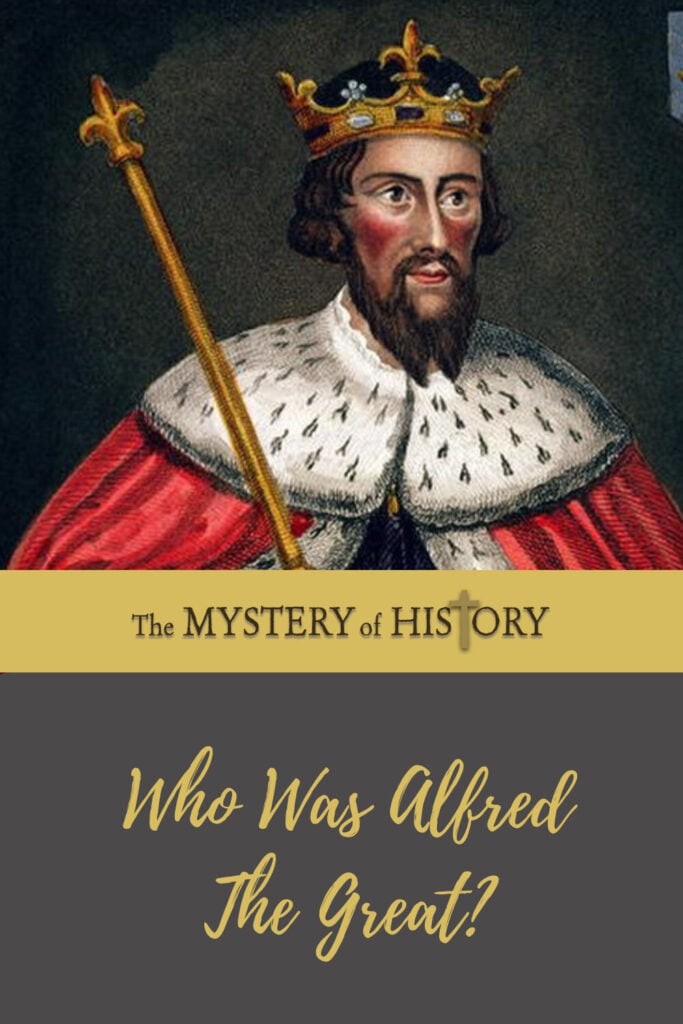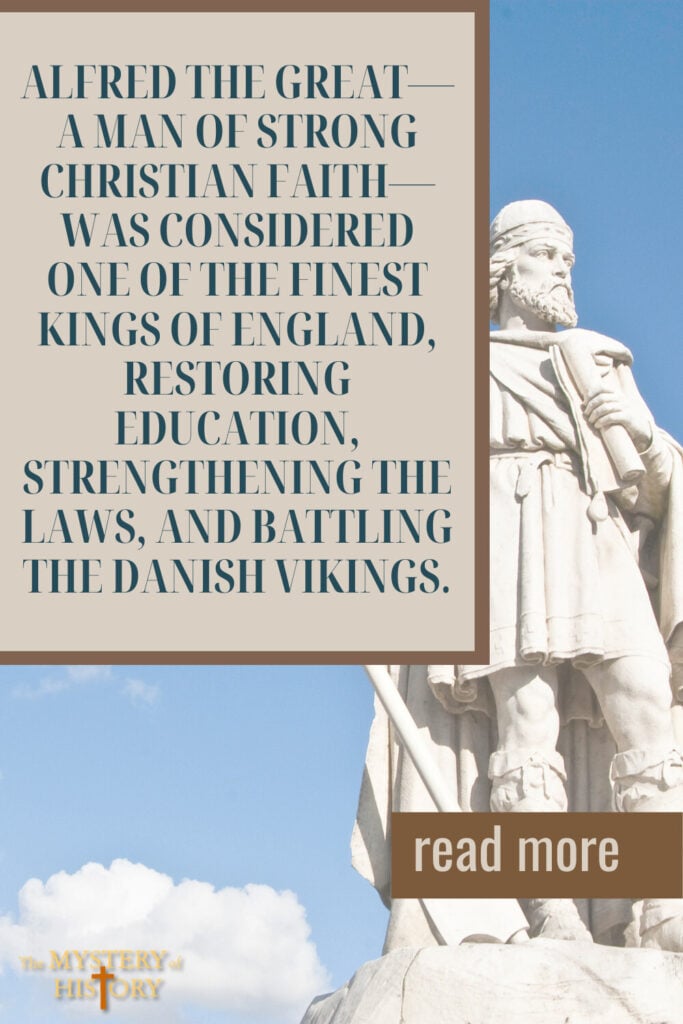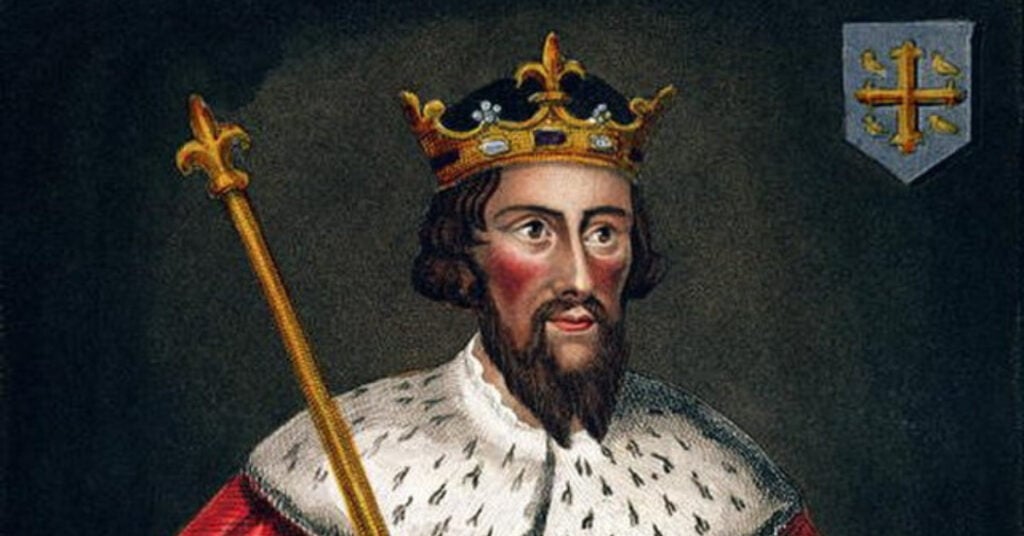Of all the kings who have ever reigned in England, only one has been called “the Great.” His name was Alfred. We’ll look at Alfred the Great today and consider why he developed this noble reputation. But first, let’s look at some background history of England.

Under the famous Julius Caeser, the Romans invaded England in 55 B.C. The Romans stayed for 300-400 years, living side by side with the Celts, an early tribe inhabiting England. For better or for worse, the Western Roman Empire collapsed in A.D. 476. As the Roman Empire toppled, three new tribes invaded England. They were the Angles, the Saxons, and the Jutes. The Romans fled, but the Celts stayed, and melded with the Angles, the Saxons, and the Jutes. Together, they set up seven kingdoms in England. Unlike the Romans, these tribes dug deep roots in England. Even the name England comes from the Angles (Angle-land). It was during this period, too, that Christianity was brought to England. But peace didn’t last. There was another people group that invaded England. They were the Danish Vikings. Now, let’s look at “Who was Alfred the Great?”
Alfred, King of Wessex
Alfred was born the youngest of five boys in Berkshire, England. Legend has it that his mother created a reading contest, awarding a prize to whichever son could learn to read first. Against all odds, Alfred beat his older brothers! He was awarded a book of Anglo-Saxon poems. In 871, Alfred became the king of Wessex, the western kingdom of the Saxons. He was only 22. He was wise, graceful, and a good hunter. Alfred the Great—a man of strong Christian faith—was considered one of the finest kings of England for restoring education, strengthening the laws, and battling the Danish Vikings. War with the Vikings would prove to be his most challenging trial.

Danish Vikings
Danish Vikings ravaged the coast of England, raiding churches and monasteries. In his first year as king, Alfred fought nine battles against them! Legend says that King Alfred once disguised himself as a minstrel (or entertainer) and snuck into the Danish camp. There, while performing for Guthrum, the Danish chieftain, Alfred secretly learned of their plans and strategies. By springtime, King Alfred was able to rally his troops and force Guthrum and the Danish Vikings back into submission. However, in 878, Alfred considered another way to bring peace to the land. King Alfred proposed that Guthrum and his men become Christians. And you know what? They did! Guthrum, the once-savage Danish Viking chieftain, was baptized with King Alfred standing as his godfather. In honor of the occasion, Alfred hosted a 12-day feast for all the men. If that wasn’t unusual enough, King Alfred invited the converted Danes to stay in England under a peace treaty—a treaty that bound them together under the Lordship of Jesus Christ. For a time, Guthrum and Alfred fought side by side to protect their Christian land. Unfortunately, though, other Danish warriors invaded a few years later, breaking the peace.
Danish Vikings ravaged the English countryside just as they had done in the past. Determined to end the strife, Alfred strategically took London in 886. In doing so, he subdued the Danes at last! They were pushed to an eastern region of England named the Danelaw. For at least 100 years, the Danish Vikings peacefully stayed in the Danelaw. Other kingdoms in England began to acknowledge Alfred as king. Alfred reorganized the army and built a navy to protect the coast. He worked hard at rebuilding the towns and villages that were ransacked and fortified them.
Great Works
To keep peace among the seven kingdoms in England, King Alfred created common laws, meaning he took all the laws of differing tribes and codified, or organized, them. Alfred held up each one to the standard of the Ten Commandments from the Bible. He acknowledged God’s laws as best and placed them in the beginning of his code. Furthermore, Alfred gave legal protection to the poor and promised one-eighth of the revenue to help the needy. He also worked to restore the educational system that was lost to the Danish Vikings.
It bothered King Alfred a great deal that the Danish Vikings destroyed their centers of learning. Alfred set up a palace school and brought in teachers from other parts of Europe. He gave one-eighth of the money of his kingdom to education. But even beyond that, Alfred personally saw to the translation of numerous literary works from Latin into Anglo-Saxon. This included the four Gospels of the New Testament. The language of the Anglo-Saxons is sometimes called Old English. Nearly half of modern English is derived from it. To help the English keep track of their complex history, King Alfred began to compile the Anglo-Saxon Chronicle. It was a running account of current events that was published for centuries. Alfred also gathered songs and rhymes that captured the history of England. He believed it was important for the English to develop some kind of identity. Unfortunately, he battled stomach disease for years and passed away in 899, at about age 50. But through laws, education, literature, and songs, King Alfred greatly shaped the nation of England. And that my friends answer the question, Who was Alfred the Great?
Activities
Younger Students—Create a Song.
Have your younger students remember family history with songs and rhymes. Discuss stories and events in your family’s past. Play some instrumental folk music, and then have each student try to word their own rendition of family history to create a song! Pretend to be a minstrel and sing your songs for your class or family.
Middle and Older Students—Old English.
A good amount of modern English is derived from Anglo-Saxon Old English. Can you read Old English? Read aloud the following examples of Old English and guess their meaning. (Answers are provided below.)
Anglo-Saxon (Old English)
• baec
• cynd
• disig
• flod
• foda
• fyllan
• geolu
• ham
• lond
• reef
• shire
• shire + reef
• standan
• ton
• wascan
• windige
Answer Key
Baec =Back
Cynd=Kind
Disig= Dizzy
Flod=Flood
Foda=Food
Fyllan=Fill
Geolu=Yellow
Ham=Home (i.e Nottingham)
Lond=Land
Reef=King’s Agent
Shire=County
Shire + Reef=Sheriff
Standan=Stand
Ton=Town
Wascan=Wash
Windage=Windy
[This blog excerpt was condensed for publication by The Mystery of History intern, Selah Elder.]



